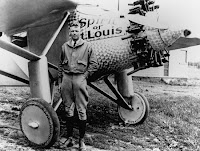 Here's why I like Bill Bryson: he can talk about anything and he's interesting, charming, rambling, funny. Anything. He's proved this point with his travel memoir-type books like A Walk in the Woods and his histories like A Short History of Nearly Everything and his memoir The Life and Times of the Thunderbolt Kid. He's an American with an English accent who isn't afraid to make fun of himself for being an American with an English accent. The guy, at least based upon his books, is the person you want to be seated beside at the dinner party full of strangers.
Here's why I like Bill Bryson: he can talk about anything and he's interesting, charming, rambling, funny. Anything. He's proved this point with his travel memoir-type books like A Walk in the Woods and his histories like A Short History of Nearly Everything and his memoir The Life and Times of the Thunderbolt Kid. He's an American with an English accent who isn't afraid to make fun of himself for being an American with an English accent. The guy, at least based upon his books, is the person you want to be seated beside at the dinner party full of strangers. |
| Lucky Lindy |
 |
| The Babe |
...Except maybe for Babe Ruth. 1927 was also the year that Ruth and Gehrig kicked off the first home run race in baseball history and Ruth eventually hit 60 dingers. Some whole teams didn't hit 60 home runs that season. Only one player since 1927--Roger Maris--has matched this feat without steroids. And you can't overlook the popularity of baseball in 1927. Radio broadcast games around the country, and in places where there weren't teams, actors would recreate the games in real time for crowds.
 |
| Bill Bryson |
And the summer of 1927 was Al Capone's time to shine as a gangster and liquor distributor, keeping booze flowing freely into Prohibition America. It was the summer that anarchists Sacco and Vanzetti were electrocuted. The Jazz Singer was filmed, forever changing movies by adding sound. Jack Dempsey popularized boxing, turning a tavern sport into one that could fill Madison Square Garden. Four bankers met and planned the financial strategies that would ultimately lead to the Great Depression.
On top of the events of 1927, Bryson is the master of the fascinating tangent, and One Summer is full of them. When writing about the execution of Sacco and Vanzetti, Bryson takes the time to recount the story of the executioner who figured out the proper way to electrocute a human. If you read/watched The Green Mile, you will recall that barbecued convict is traumatizing for all and best avoided. The book is full of these fun moments that make cultural history interesting and relatable. It's pretty easy to see how a fad like a guy sitting on the top of a flagpole in 1927 morphs into David Blaine's stunts. I admit it: I watched Blaine almost drown to death on live TV. I would have gawked at Shipwreck Kelly perched on a flagpole.
One Summer is good stuff. It's a great gift choice for a wide variety of readers, from dads/uncles/brothers who only read nonfiction, to pop history readers who liked Eric Larson's books, to my friend Tracy's dad's special lady friend Maggie who likes smart but readable books, to people who miss their really interesting college lecturers. And for commuters, Bill Bryson is audiobook gold.


No comments:
Post a Comment